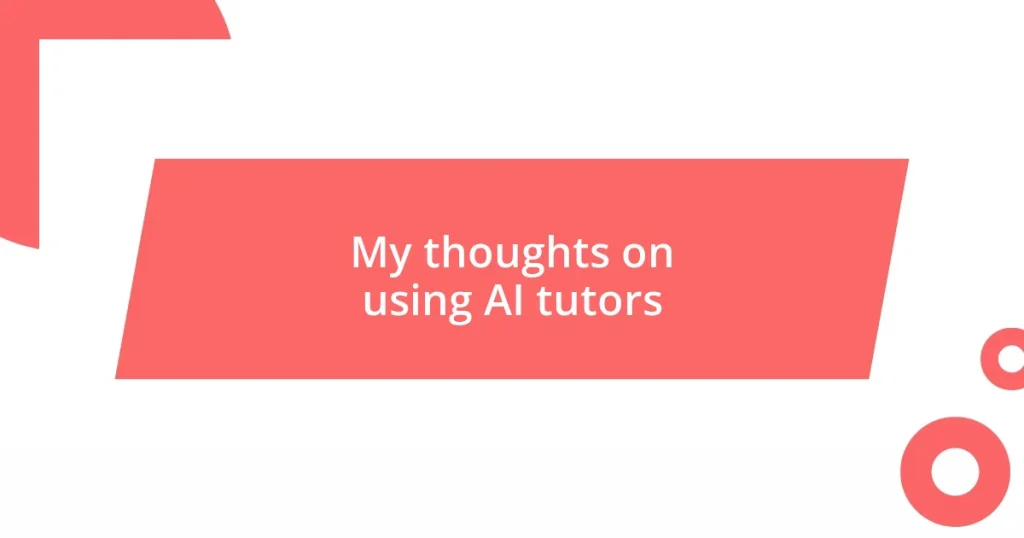Key takeaways:
- AI tutors offer personalized learning experiences, adapting to individual needs and progress, promoting improved understanding and confidence.
- Choosing the right AI tutor involves considering learning style compatibility, content customization, and user interface, making the selection process personal and significant.
- The future of AI in education is promising, with potential for enhanced collaboration, tailored learning pathways, and increased access to quality education worldwide.
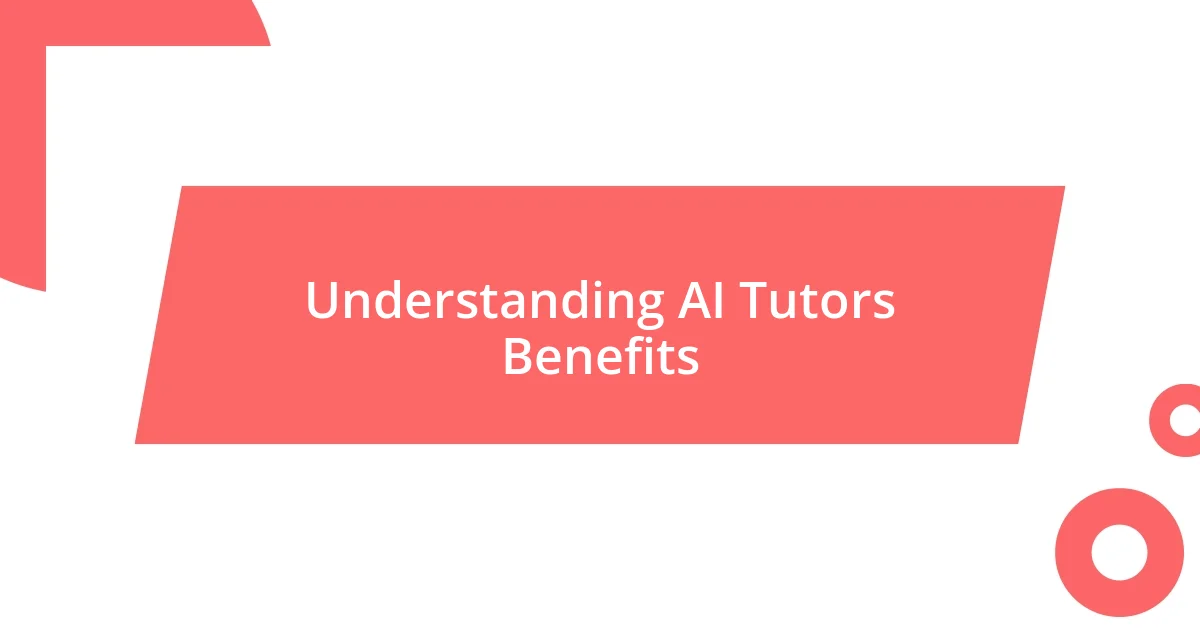
Understanding AI Tutors Benefits
One significant benefit of AI tutors is their ability to provide personalized learning experiences. I remember when I struggled with statistics in college; an AI-driven program could have tailored exercises to my specific weaknesses, allowing me to grasp concepts at my own pace. Isn’t it refreshing to think that learners can now have a tutor that adapts to their unique needs like this?
Moreover, the accessibility of AI tutors is remarkable. I often think about how busy life can get, and squeezing in study time can feel overwhelming. Imagine having the flexibility of an AI tutor available 24/7, ready to help you practice or clarify doubts whenever it suits you best. Doesn’t that sound empowering?
Lastly, let’s not overlook the consistency AI tutors offer. Unlike human tutors, who might have off days or varying moods, AI maintains a steady approach to instruction. This reliability can foster a sense of stability for learners. Have you ever had a teacher who inspired you every day? AI tutors can strive to create that same impact, continuously nudging you toward understanding and mastery.
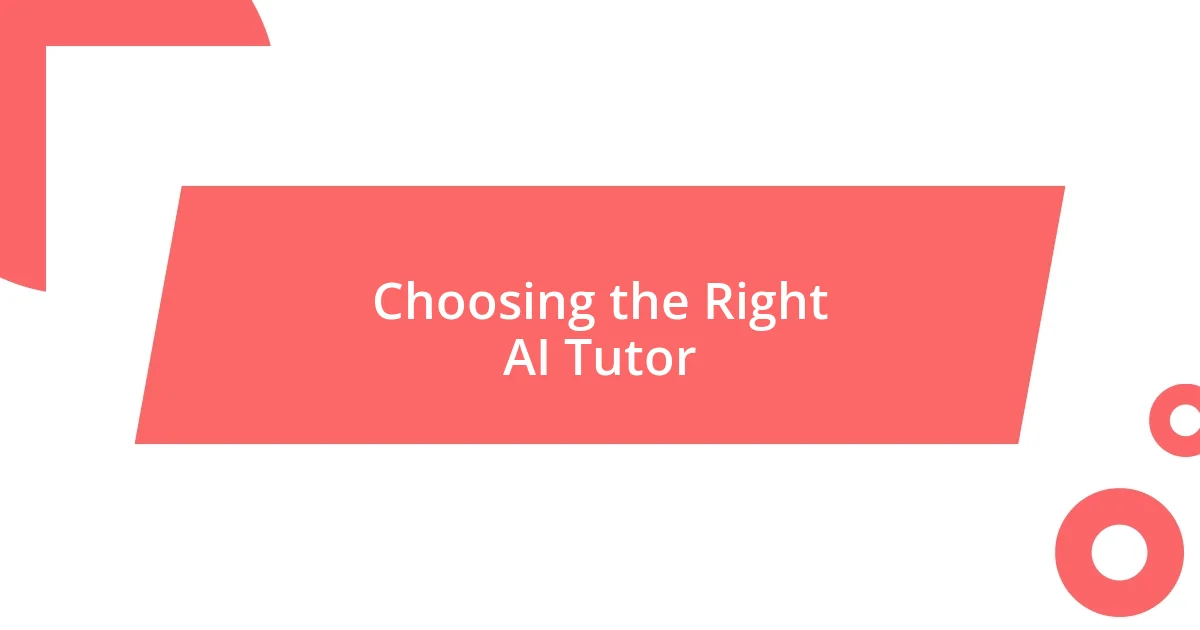
Choosing the Right AI Tutor
When it comes to choosing the right AI tutor, it’s essential to consider your specific learning preferences and goals. I recall a time when I used a language-learning app that wasn’t interactive enough for my style. Switching to a platform that engaged me through conversation and gamified learning made all the difference. Finding an AI tutor that aligns with your needs is crucial for staying motivated and on track.
Here are some factors to keep in mind:
- Learning Style Compatibility: Does the tutor support visual, auditory, or kinesthetic learning preferences?
- Content Customization: Can the AI adapt lessons based on your progress and feedback?
- User Interface: Is the platform intuitive and easy to navigate?
- Feedback Mechanism: How quickly and effectively does the AI provide feedback on quizzes and exercises?
- Trial Options: Does it offer a free trial or demo to help you get a feel for its teaching methods?
Selecting the right AI tutor is a more personal journey than it seems. For me, it involves a bit of trial and error to find the best match, but it’s worth the effort to feel confident in my learning companion.
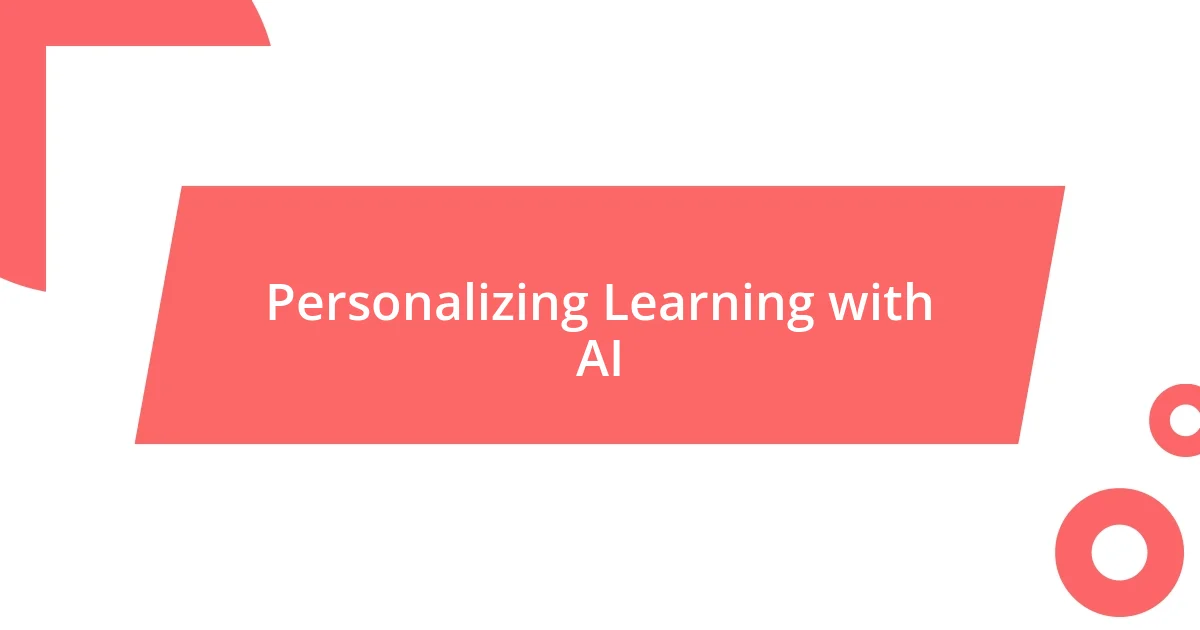
Personalizing Learning with AI
One of the most exciting aspects of AI tutors is their capacity for personalized learning pathways. I recall a friend of mine who struggled with math concepts; when using an AI tutor, it created a tailored syllabus that adjusted based on her performance. This kind of individualized approach not only helps identify gaps but also builds confidence as students learn at their own pace.
Additionally, the data-driven nature of AI allows for an insightful analysis of learning patterns. I once experimented with an AI reading assistant that tracked my progression through various literature. By analyzing my strengths and weaknesses, it provided book suggestions aligned with my interests, making my reading experience not only pleasurable but also enriching—much better than random recommendations!
In the realm of education, personalizing learning with AI is not just about convenience; it’s about nurturing a learning environment that resonates with each student. Imagine if every student could have their personal guide, adjusting lessons and support based on their emotional and academic needs. This creates a symbiotic relationship where learners feel seen and understood, encouraging them to engage more deeply in their studies.
| AI Tutor Features | Traditional Teaching Methods |
|---|---|
| Personalized learning based on student progress | Standardized curriculum for all students |
| 24/7 availability for support | Scheduled class times only |
| Data-driven insights into learning patterns | Basic assessments without in-depth feedback |
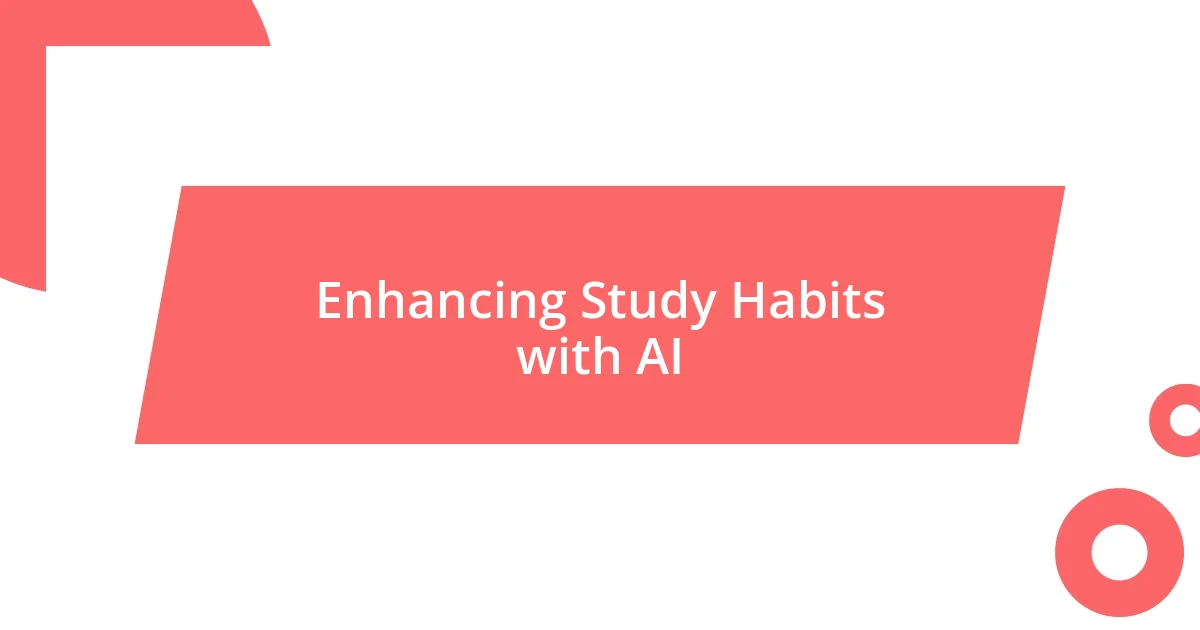
Enhancing Study Habits with AI
Using AI tutors to enhance study habits is like having a personal coach right at your fingertips. I remember a late night when I was cramming for an exam, feeling overwhelmed. That’s when I turned to an AI tool that could break down the material into bite-sized chunks tailored to my weak spots. It was a game-changer! The immediate support and customized drills made me feel less anxious and much more focused.
Moreover, the constant tracking of my progress motivated me in ways I hadn’t anticipated. I often think back to the time I noticed an unexpected improvement in my retention. The AI highlighted my growth with every quiz, which fueled my confidence. Isn’t it fascinating how positive reinforcement, generated by timely feedback, can profoundly affect our mindset and study habits?
AI tutors also foster a sense of accountability. When I started using a virtual assistant to schedule my study sessions, I realized I became more disciplined. I could set reminders, track my goals, and even assess how well I was sticking to my study plans. Have you ever struggled to maintain a consistent routine? I used to find it so challenging, but with AI, I felt supported and guided almost like I had a study buddy, driving me toward my academic goals.
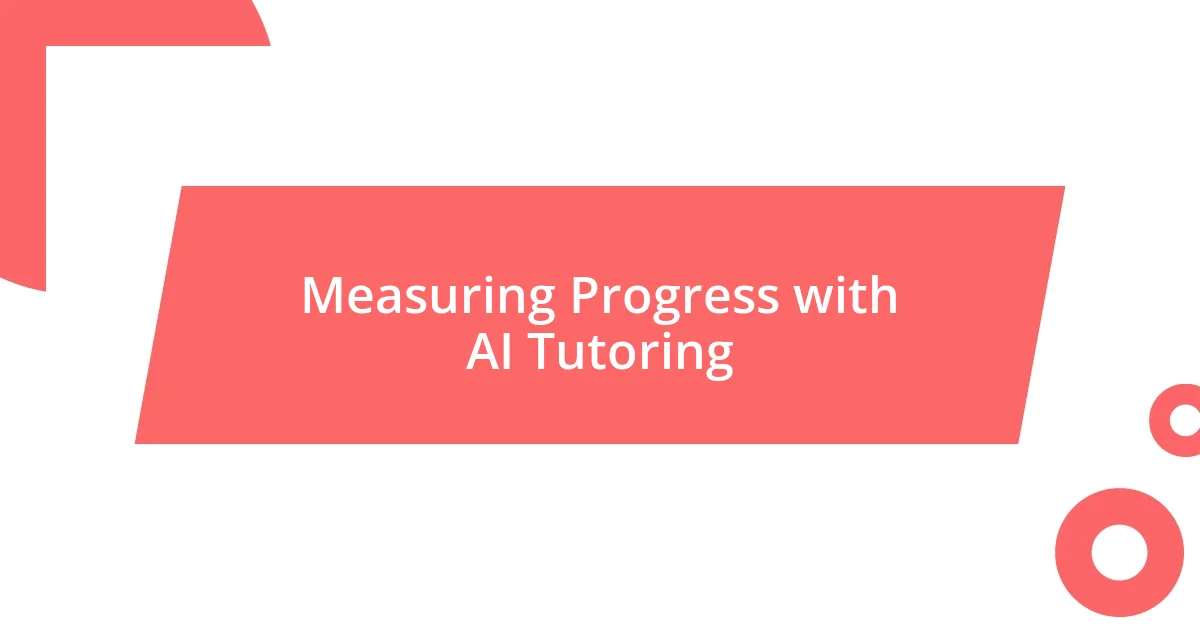
Measuring Progress with AI Tutoring
When it comes to measuring progress with AI tutoring, I’ve found that the immediate feedback is incredibly powerful. Recently, while using an AI tool to master a foreign language, I appreciated how it provided instant scores after each practice test. That real-time feedback gave me a clear sense of where I stood, motivating me to tackle my weak points right away.
What strikes me most is the way AI tutors can illustrate progress visually. I remember using a platform that generated graphs showing my vocabulary growth over time. It was exciting to see my hard work translate into measurable outcomes. Have you ever felt that rush of excitement when you realize you’re actually improving? It’s hard to replicate that feeling with traditional study methods.
Moreover, I’ve noticed that tracking progress through various metrics, like time spent on each topic or accuracy rate, fosters a culture of self-reflection. Reflecting on my experiences, I often returned to the areas where I struggled the most. This pointed analysis allowed me to set targeted goals. How often do we really assess our learning journeys? It’s enlightening to think about how AI can elevate our understanding by making progress transparent and actionable.
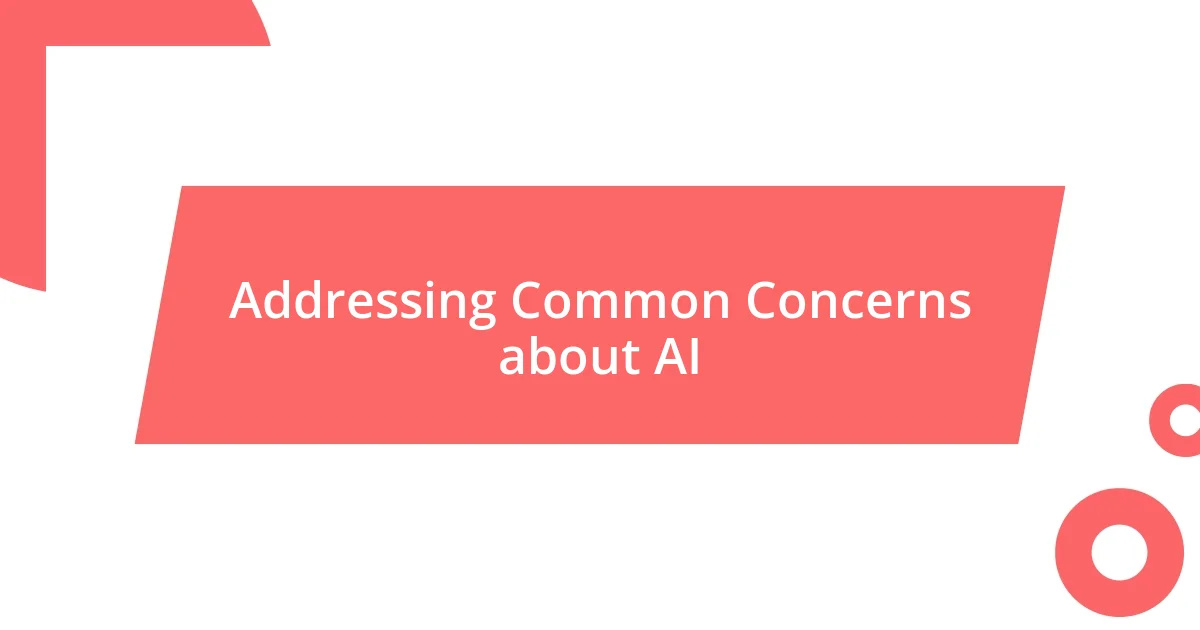
Addressing Common Concerns about AI
It’s natural to have concerns about AI tutors and their effectiveness. I still remember speaking to a friend who worried that these tools might replace traditional teachers. I explained to her that, in my experience, AI serves more as a supplement. While it offers personalized support, the human touch—like the encouragement from a mentor or the spontaneity of a classroom discussion—is irreplaceable.
Another common concern is the fear of technology overloading students. I once felt that way after using an AI tutor for extensive test preparation. At times, it felt overwhelming to juggle multiple features and analytics. However, I discovered that setting clear boundaries and focusing on one area at a time made the experience less daunting. Have you ever felt buried under too many options? Simplifying the process turned out to be the key to enjoying the journey rather than just stressing over it.
Lastly, data privacy is often on people’s minds when discussing AI tools. I shared this sentiment until I dug deeper into the privacy policies of the platforms I used. It reassured me greatly to learn how seriously those companies take security. I’d advise anyone using AI to educate themselves on these policies. After all, understanding how our data is handled helps foster a sense of trust, making us more comfortable as we embrace new learning technologies.
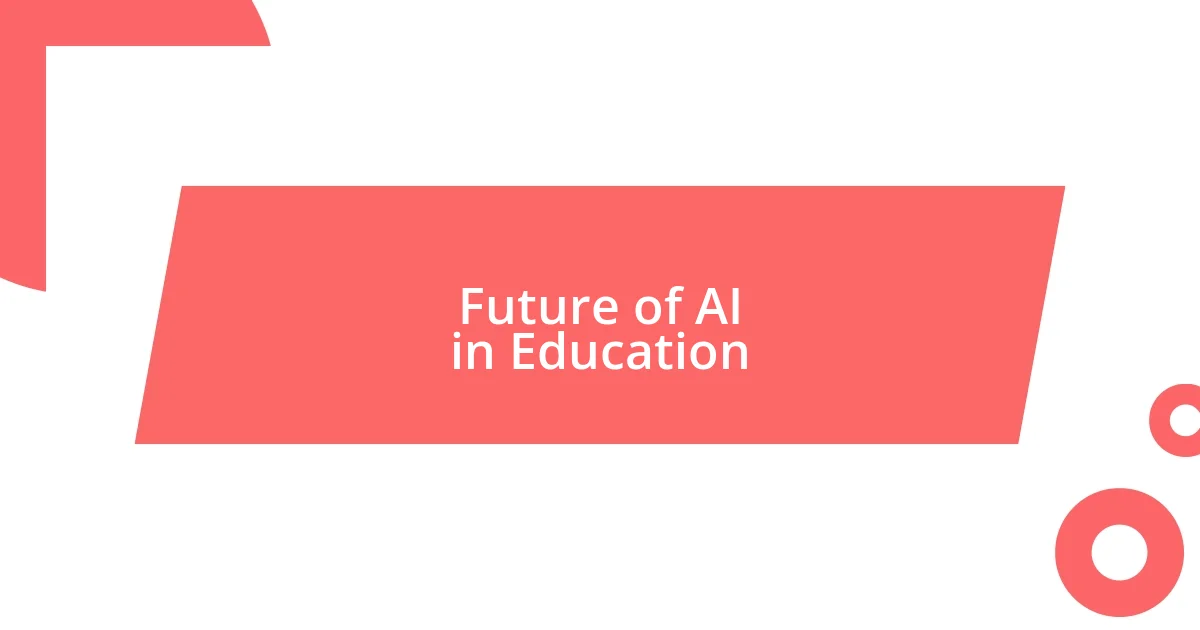
Future of AI in Education
The future of AI in education holds exciting potential. From my experience, I believe that AI-powered tools will evolve to offer even more tailored learning experiences, adapting to each student’s unique learning style. Can you imagine a world where an AI tutor anticipates your struggles before you even voice them? That kind of foresight could truly revolutionize how we approach learning.
Additionally, I feel strongly that the integration of AI in educational settings will foster collaboration between students and AI, making learning a more interactive process. I recently participated in a group project using an AI tool that helped us brainstorm ideas and outline our presentation. The collaborative energy in the room was palpable as we built on the AI’s suggestions, creating a final product that felt richer and more cohesive than anything we could have crafted alone. Isn’t it fascinating how technology can enhance teamwork?
Moreover, I can see AI tutors becoming indispensable in bridging educational gaps around the world. During my travels, I noticed how access to quality education varies drastically. AI could democratize learning, offering resources to students who lack educational support. Imagine a student in a rural area accessing the same high-quality tutoring as someone in a large city. This transformative potential gives me hope for a more equitable future in education.










